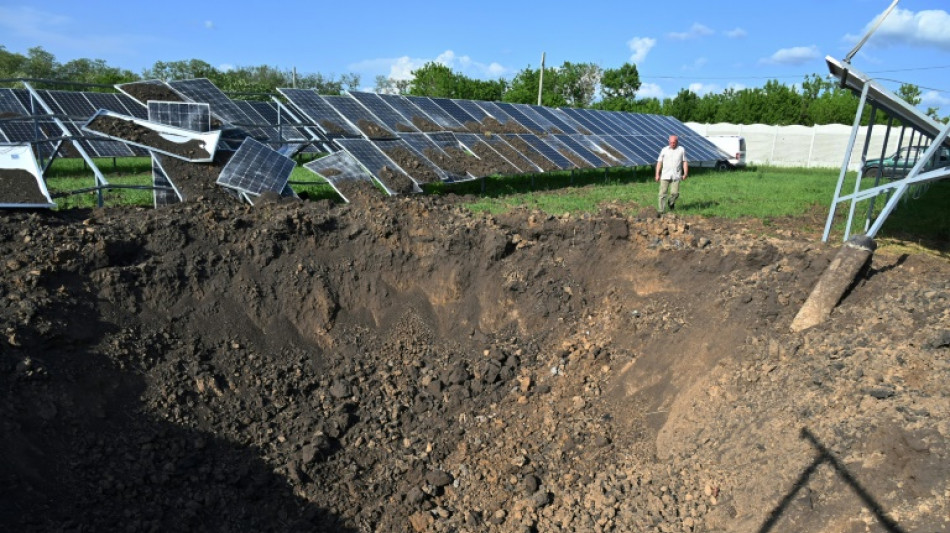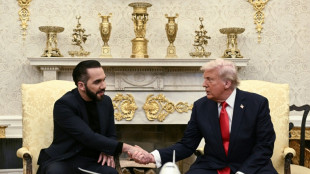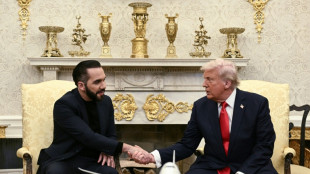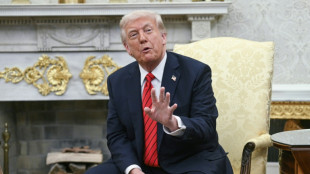
-
 El Salvador offers to swap US deportees with Venezuela
El Salvador offers to swap US deportees with Venezuela
-
Higgo holds on for win after Dahmen's late collapse

-
 El Salvador's president proposes prisoner exchange with Venezuela
El Salvador's president proposes prisoner exchange with Venezuela
-
Gilgeous-Alexander, Jokic, Antetokounmpo named NBA MVP finalists

-
 Thomas ends long wait with playoff win over Novak
Thomas ends long wait with playoff win over Novak
-
Thunder rumble to record win over Grizzlies, Celtics top Magic in NBA playoff openers

-
 Linesman hit by projectile as Saint-Etienne edge toward safety
Linesman hit by projectile as Saint-Etienne edge toward safety
-
Mallia guides Toulouse to Top 14 win over Stade Francais

-
 Israel cancels visas for French lawmakers
Israel cancels visas for French lawmakers
-
Russia and Ukraine trade blame over Easter truce, as Trump predicts 'deal'

-
 Valverde stunner saves Real Madrid title hopes against Bilbao
Valverde stunner saves Real Madrid title hopes against Bilbao
-
Ligue 1 derby interrupted after assistant referee hit by projectile

-
 Leclerc bags Ferrari first podium of the year
Leclerc bags Ferrari first podium of the year
-
Afro-Brazilian carnival celebrates cultural kinship in Lagos

-
 Ligue 1 derby halted after assistant referee hit by projectile
Ligue 1 derby halted after assistant referee hit by projectile
-
Thunder rumble with record win over Memphis in playoff opener

-
 Leverkusen held at Pauli to put Bayern on cusp of title
Leverkusen held at Pauli to put Bayern on cusp of title
-
Israel says Gaza medics' killing a 'mistake,' to dismiss commander

-
 Piastri power rules in Saudi as Max pays the penalty
Piastri power rules in Saudi as Max pays the penalty
-
Leaders Inter level with Napoli after falling to late Orsolini stunner at Bologna

-
 David rediscovers teeth as Chevalier loses some in nervy Lille win
David rediscovers teeth as Chevalier loses some in nervy Lille win
-
Piastri wins Saudi Arabian Grand Prix, Verstappen second

-
 Kohli, Rohit star as Bengaluru and Mumbai win in IPL
Kohli, Rohit star as Bengaluru and Mumbai win in IPL
-
Guirassy helps Dortmund past Gladbach, putting top-four in sight

-
 Alexander-Arnold lauds 'special' Liverpool moments
Alexander-Arnold lauds 'special' Liverpool moments
-
Pina strikes twice as Barca rout Chelsea in Champions League semi

-
 Rohit, Suryakumar on song as Mumbai hammer Chennai in IPL
Rohit, Suryakumar on song as Mumbai hammer Chennai in IPL
-
Dortmund beat Gladbach to keep top-four hopes alive

-
 Leicester relegated from the Premier League as Liverpool close in on title
Leicester relegated from the Premier League as Liverpool close in on title
-
Alexander-Arnold fires Liverpool to brink of title, Leicester relegated

-
 Maresca leaves celebrations to players after Chelsea sink Fulham
Maresca leaves celebrations to players after Chelsea sink Fulham
-
Trump eyes gutting US diplomacy in Africa, cutting soft power: draft plan

-
 Turkey bans elective C-sections at private medical centres
Turkey bans elective C-sections at private medical centres
-
Lebanon army says 3 troops killed in munitions blast in south

-
 N.America moviegoers embrace 'Sinners' on Easter weekend
N.America moviegoers embrace 'Sinners' on Easter weekend
-
Man Utd 'lack a lot' admits Amorim after Wolves loss

-
 Arteta hopes Arsenal star Saka will be fit to face PSG
Arteta hopes Arsenal star Saka will be fit to face PSG
-
Ukrainian troops celebrate Easter as blasts punctuate Putin's truce

-
 Rune defeats Alcaraz to win Barcelona Open
Rune defeats Alcaraz to win Barcelona Open
-
Outsider Skjelmose in Amstel Gold heist ahead of Pogacar and Evenepoel

-
 Arsenal make Liverpool wait for title party, Chelsea beat Fulham
Arsenal make Liverpool wait for title party, Chelsea beat Fulham
-
Trump slams 'weak' judges as deportation row intensifies

-
 Arsenal stroll makes Liverpool wait for title as Ipswich face relegation
Arsenal stroll makes Liverpool wait for title as Ipswich face relegation
-
Sabalenka to face Ostapenko in Stuttgart final

-
 Kohli, Padikkal guide Bengaluru to revenge win over Punjab
Kohli, Padikkal guide Bengaluru to revenge win over Punjab
-
US aid cuts strain response to health crises worldwide: WHO

-
 Birthday boy Zverev roars back to form with Munich win
Birthday boy Zverev roars back to form with Munich win
-
Ostapenko eases past Alexandrova into Stuttgart final

-
 Zimbabwe on top in first Test after Bangladesh out for 191
Zimbabwe on top in first Test after Bangladesh out for 191
-
De Bruyne 'surprised' over Man City exit


Echoes of WWI in Ukraine war's artillery duels and trenches
Looking at the shell-blasted, trench-marked landscapes of the front lines in Russia's invasion of Ukraine from above, it's easy to see why experts and leaders have drawn parallels with World War I.
Satellite images like those from US firm Maxar portray "war landscapes comparable to those visible during the First World War, totally destroyed villages all along the front line," said Nicolas Beaupre, a board member at a French association for research into the 1914-18 conflict.
Pictures taken last week showed fields strewn with vast craters near the town of Sloviansk and evidence of shell blasts along the Siverskyi Donets river.
But beyond the visual similarities, the hopes and fears stoked internationally by the conflict and its difference from recent fighting elsewhere bear comparison with the "Great War" -- even if the thousands of casualties in Ukraine over four months fall far short of the thousands per day seen over 100 years ago.
In 2022, many thought the fighting would be over in days or weeks as Russian forces advancing from Belarus threatened the capital Kiev -- recalling the WWI mantra that things would be "over by Christmas".
A quick war would have been in line with recent battles around the Russian periphery, including Moscow's 2008 attack on Georgia, its 2014 occupation of Crimea or the Armenian-Azerbaijani conflict of 2020 over the Nagorno-Karabakh region.
But determined defence by the Ukrainians pushed back repeated assaults, forcing the attackers to reorient towards the present grinding war of attrition in the eastern Donbas region.
Those early days of the war generated their own heroic tales, like the defiant soldiers of Snake Island radioing expletives to a Russian warship demanding their surrender, or the legendary fighter pilot dubbed the "Ghost of Kyiv".
In filling a need for a popular story to boost morale, these are not unlike the fleet of commandeered Paris taxis who supposedly helped save the capital by ferrying soldiers to the 1914 Battle of the Marne.
Evoking another French national memory, Ukrainian President Volodymyr Zelensky has compared the scene in his country's east with "the ruins of Verdun", the bitter 1916 defence against a German offensive that became a symbol for the entire war.
- Fear of escalation -
Meanwhile, a top preoccupation of leaders in Western capitals like Berlin has been avoiding an escalation that would lead to open conflict between Russia and NATO.
Some German politicians have even cited by name Christopher Clark's book "The Sleepwalkers" on the causes of the First World War, fearing a rerun of the spiral of military move and counter-move resulting from the killing of Austrian Archduke Franz Ferdinand in June 1914.
Russian President Vladimir Putin has put a modern twist on the escalation scenario with his early, public order to place Russian nuclear forces on high alert -- raising the spectre of the ultimate tit-for-tat with the West.
Citing reports about unease over the war among Putin's entourage, Australian historian Clark told German broadcaster Deutsche Welle in May that "there's a lot to suggest that the system would be robust enough to avoid such a risk" -- unlike after the 1914 Sarajevo assassination.
The Ukraine war is also seeing the use on European soil, and at large scale, of battlefield weapons that have mostly been used in deployments far overseas.
NATO-made kit including drones and precision artillery systems are being used alongside large formations of tanks and infantry.
Back in WWI, many of the weapons suddenly mowing down European young men in their thousands had only previously been used in anger in colonial settings against technologically outmatched opponents.
Russia has also reached into the past for artillery shells that fling out metal darts known as flechettes, widely used in World War I and rarely since, Britain's Guardian newspaper reported in April.
More broadly, "it's obvious that the Ukraine conflict is on a large scale, with relatively fixed front lines that move slowly and where advances are mostly achieved through artillery duels," said Olivier Kempf of the French Foundation for Strategic Research (FRS) think tank.
- Eternal trenches -
Still, there are huge differences between the two conflicts.
"People see a lot of trenches and tend to make the parallel with World War I, even though trenches are a fortification system seen in many other conflicts" like Nagorno-Karabakh, said war historian Camille Harle Vargas.
"When there's shrapnel flying in all directions, it's best to get your head down, and the best way to do that is to be at ground level," said defence expert Joseph Henrotin.
Modern artillery has also come a long way in the last century, offering much longer ranges and higher precision -- sometimes thanks to drones, which are far more effective than the early spotter planes used in 1914-18.
And with roughly 200,000 men on each side, the conflict remains far smaller.
Ukrainian forces are using up to 6,000 shells a day, according to deputy intelligence chief Vadym Skibitsky, where around 1.5 billion -- or one million per day -- were fired in WWI.
F.Pavlenko--BTB



